Charger Miboxer C2 4000
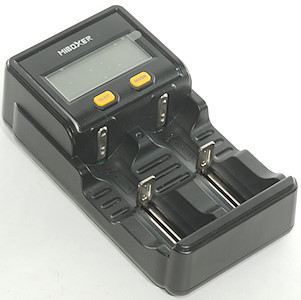
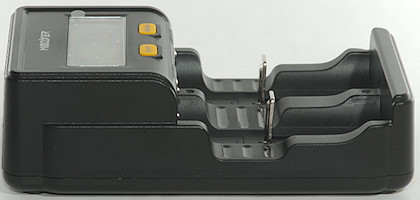
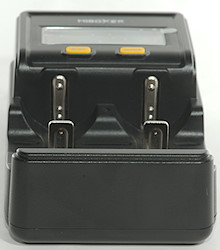
Miboxer has made a universal analyzing charger this time, that can handle larger batteries.
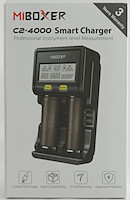
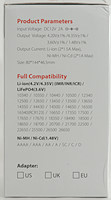
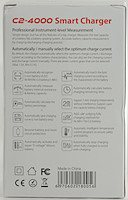
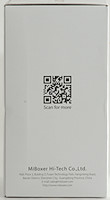
The charger comes in a retail box. There is some specification on the box.
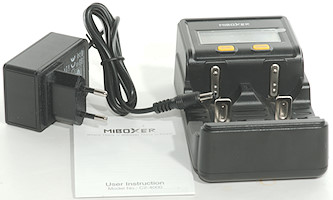
The pack contained the charger, a power supply and an instruction sheet.
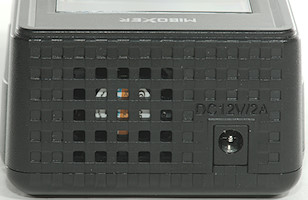
The power input is a 12V barrel connector, besides the connector is a fan. This fan is only used during discharge and keep the charger and battery very cool, but it is noisy.
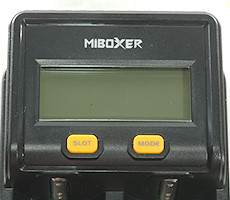
The charger will usual select charge current based on internal resistance and chemistry based on voltage (Only LiIon 4.2V and NiMH), but it is possible to manually override the current selection and also select LiFePO4 or LiIon 4.35V. Chemistry and analyze function requires a special key sequence to select.


The C1/C2 labels show what slots is selected.


Some example of the readout. The charger can display: Estimated charge time, used time, current, voltage, internal resistance and mAh
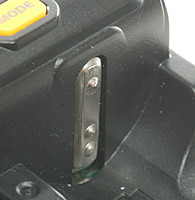
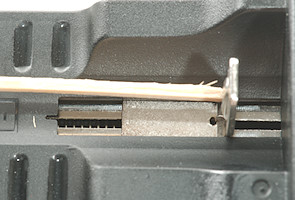
The battery slot is the typical slider construction, but are made to work with both small and large round cells. The slot accepts from 32mm to 72mm long cell and up to 32mm diameter, both LiIon and NiMH.
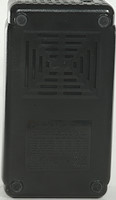
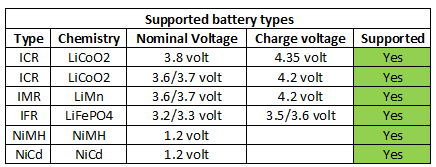
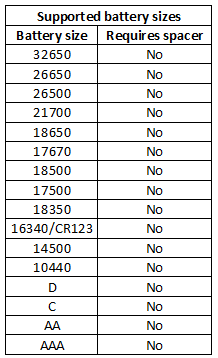
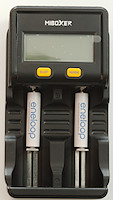
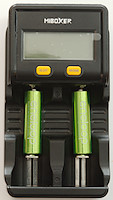
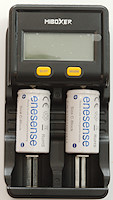
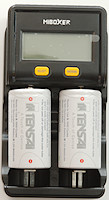
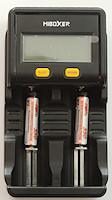
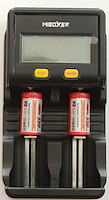
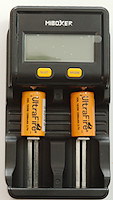

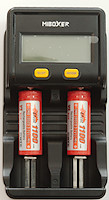
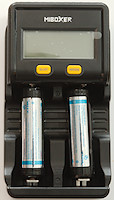
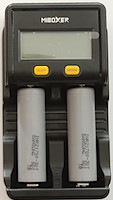
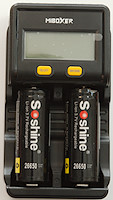
The current may be too high for small cells on automatic and requires manual override.
Measurements
- Power consumption when idle is 0.15watt from mains.
- Will discharger a LiIon battery with about 1.2mA when not powered.
- Will discharger a NiMH battery with about 0.05mA when not powered.
- Assumes NiMH below 1.9 volt and LiIon above.
- Voltmeter is within 0.01 volt
- Voltmeter stops updating when battery is full.
Charging 4.2V LiIon
Currents: Auto, 0.2, 0.3, 0.5, 0.8, 1.0 and 1.5
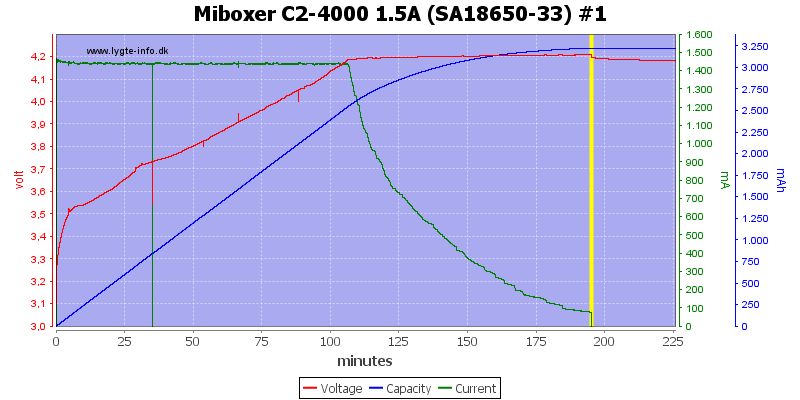
A nice CC/CV voltage charge with a termination current of about 100mA.
At about 34 minutes the charger stops charging to measure the internal resistance, this is an update to the measure taking at the start of the charge.
Display shows: 3:14 3250mAh 97mOhm
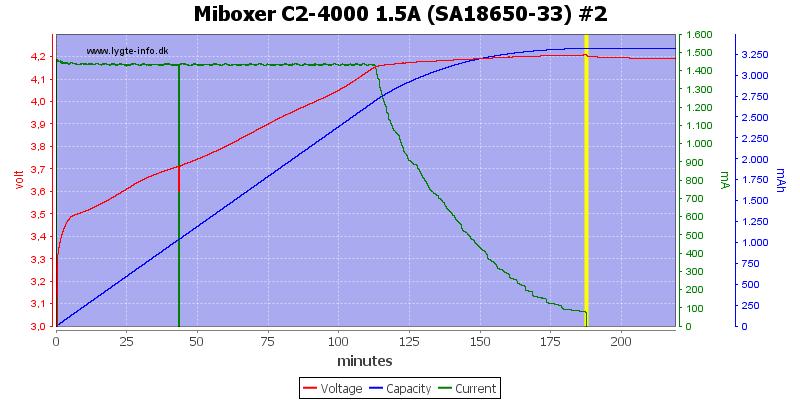
This slot looks just as fine.
Display shows: 3:07 3362mAh 93mOhm
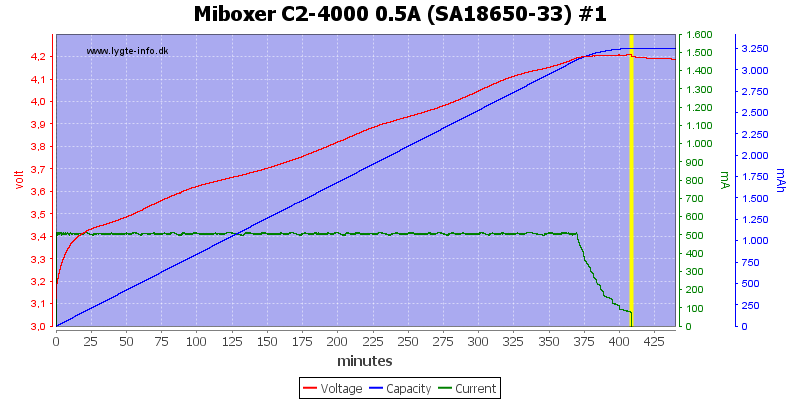
Here I use a lower charge current, this curve is also fine here.
Display shows: 6:47 3214mAh 62mOhm
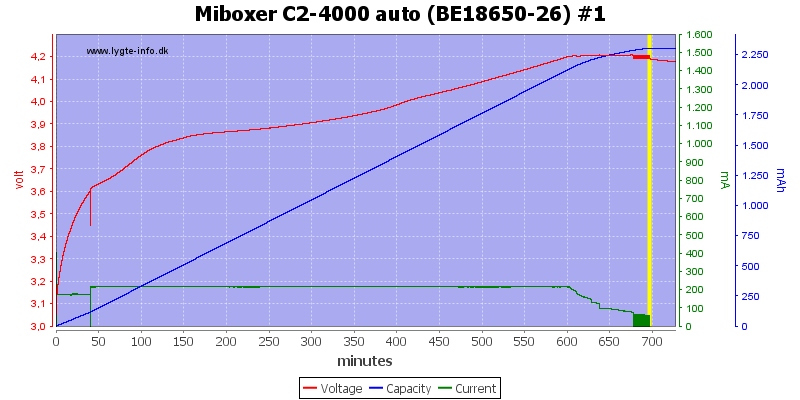
Letting the charger select current slows down the charger because it is a old cell and my test equipment also add a little bit of resistance.
In this case there is a detail with termination: the battery voltage drops when current stops and the charger restart the charging, this continues for about 25 minute, before the charger terminates fully.
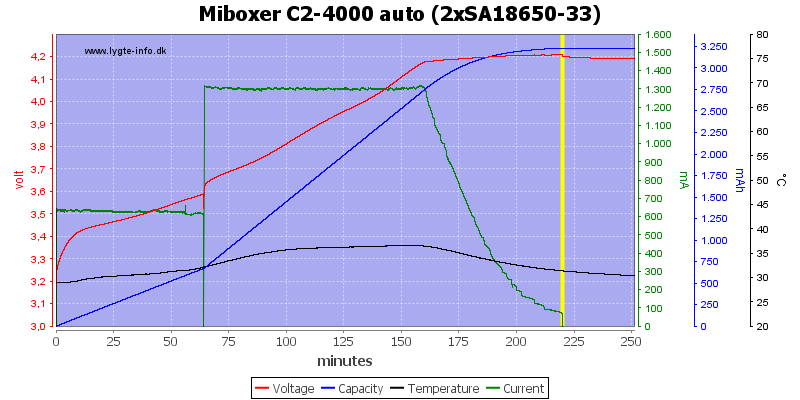
Here I am charging two batteries on automatic. When the charger check the internal resistance it can see it has dropped and it will increase the charge current.
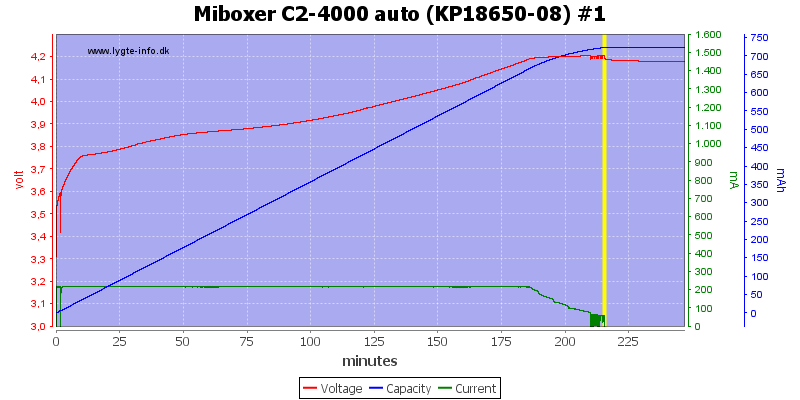
A small cell older cell will be charged with low current.
Display shows: 3:34 851mAh 296mOhm
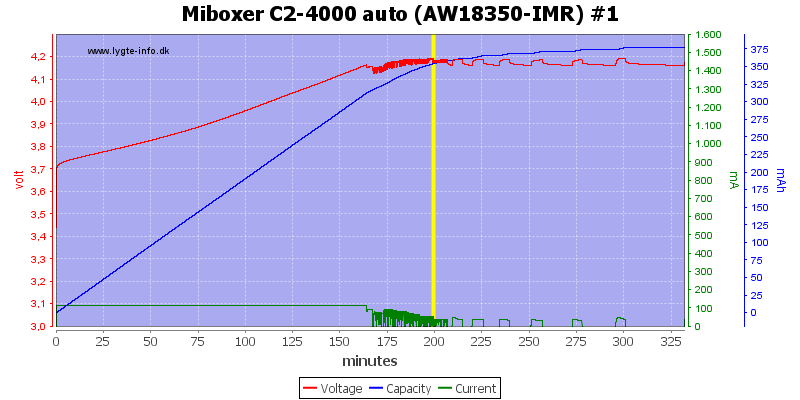
This very old cell is charged with the lowest possible charge current, but the termination is a bit problematic anyway.
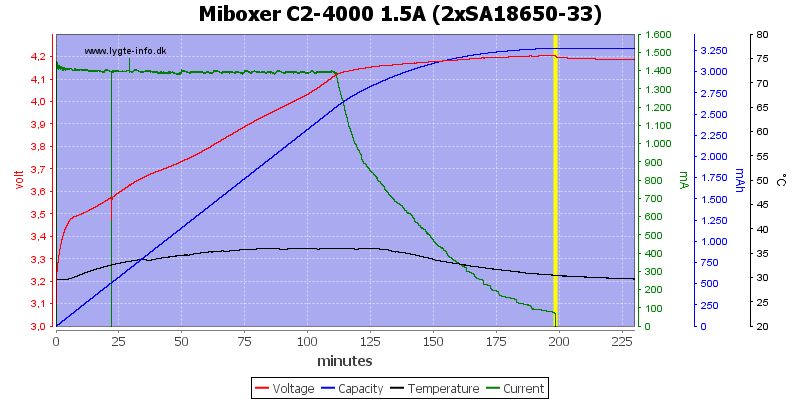
Two cells, both at 1.5A is no problem.
Display shows: 3:18 3410mAh 117mOhm and 2:52 3350mAh 49mOhm
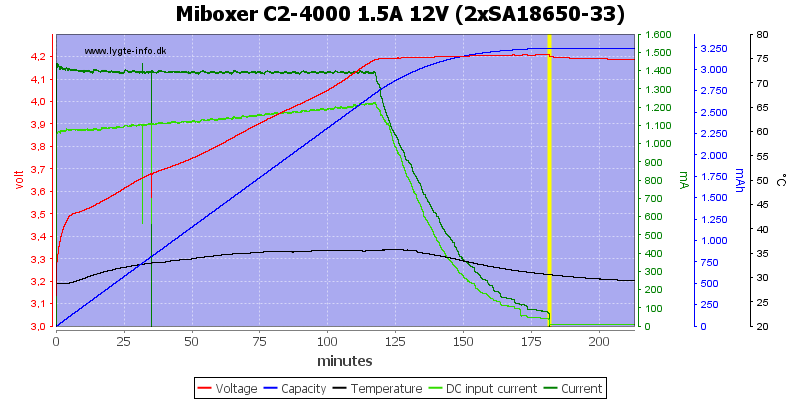
Using my own power supply I can see the current draw is about 1.2A
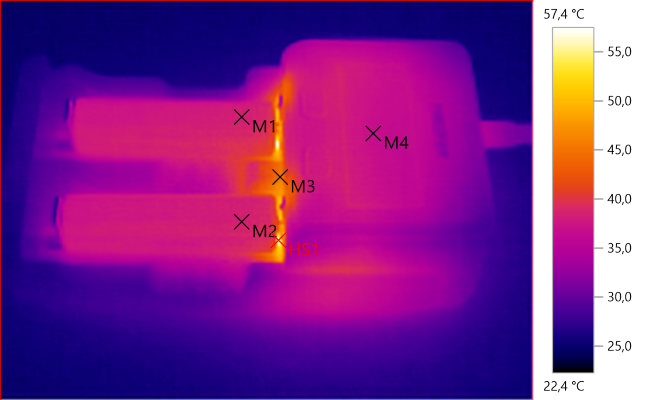
M1: 38,4°C, M2: 38,6°C, M3: 45,2°C, M4: 36,9°C, HS1: 57,4°C
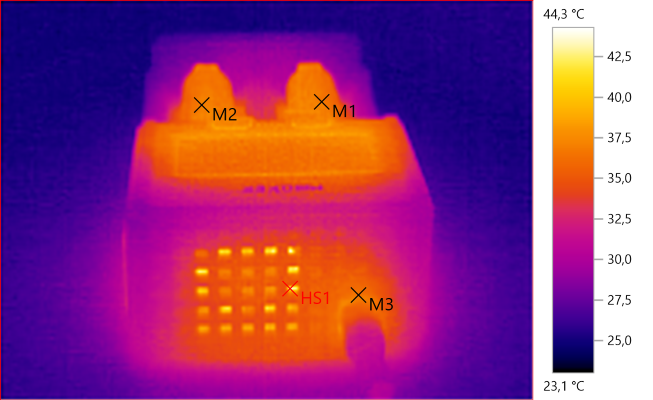
M1: 36,9°C, M2: 37,0°C, M3: 36,6°C, HS1: 44,3°C
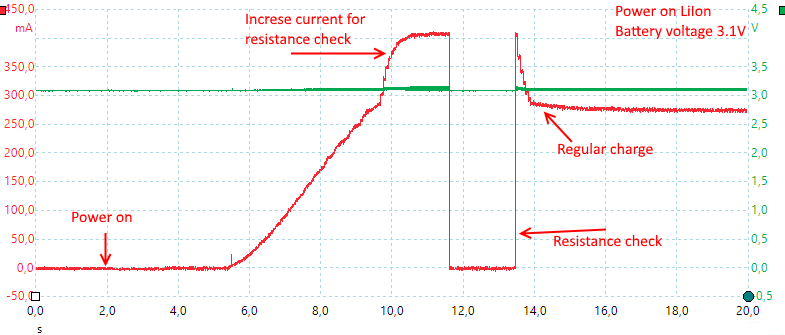
When powered on the charger need about 4 seconds to initialize, then it will check the internal resistance of the battery and start charging at the automatic selected current.
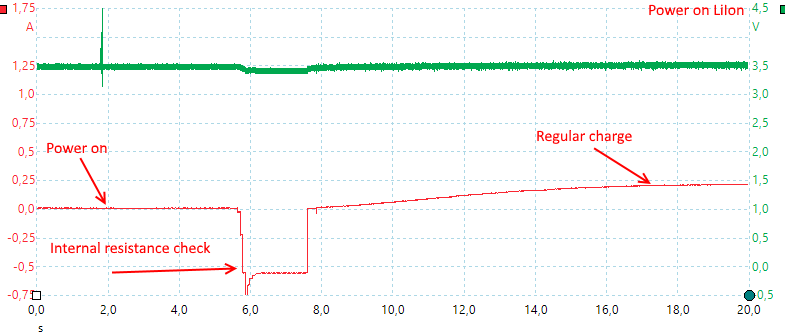
At higher voltage it will use a discharge pulse to check the internal resistance. This is also the method that is used for the check during charge.
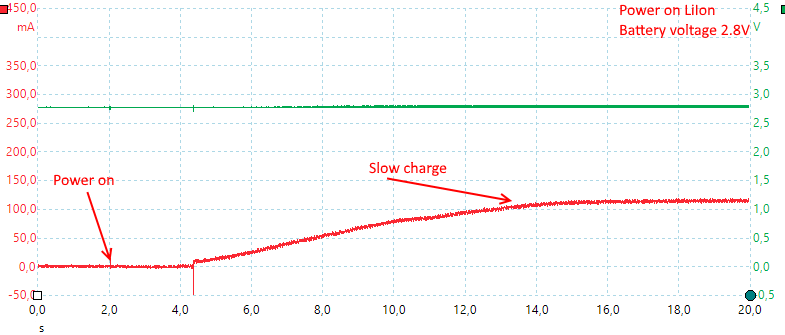
With battery that are very low the charger will not check the internal resistance, but just start on a slow charge.
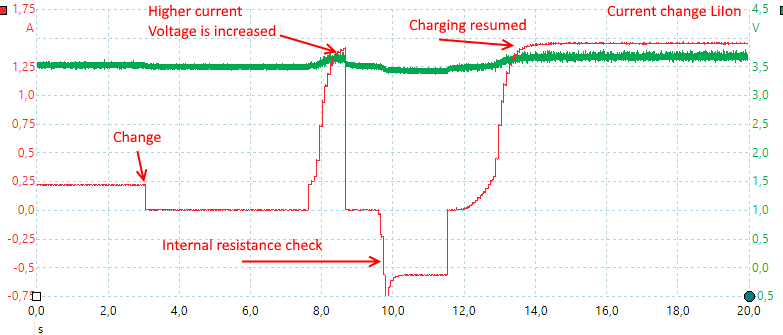
When the MODE button is pressed the selected current is shown, more presses will change this current.
Because I increased the current, the voltage over the battery increased and that was enough to force a check of the internal resistance.
Testing 4.2V LiIon
The charger can test batteries, this includes a charge, a discharge and a final charge at the selected current (including auto).
When discharging the fan is used. The display shows the total test time, not only the discharge time.
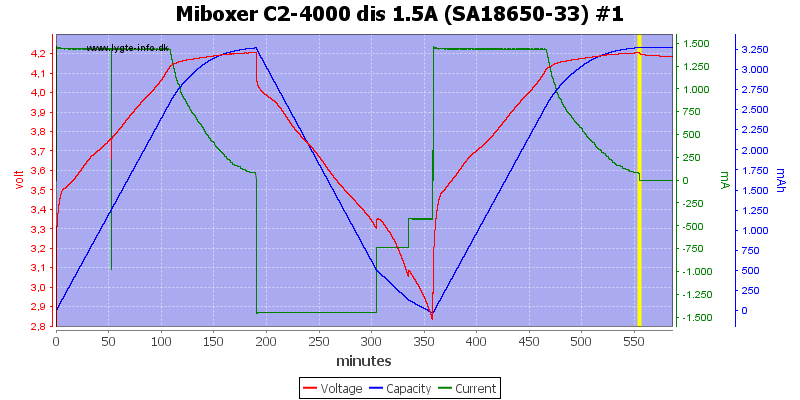
Charging and discharge at 1.5A. The discharge is not done at 1.5A all the way, the charger will reduce the discharge current when the battery is close to empty. This will give more precise capacity measurements, but not what the battery can do at 1.5A.
Display shows: 9:12 3387mAh 107mOhm
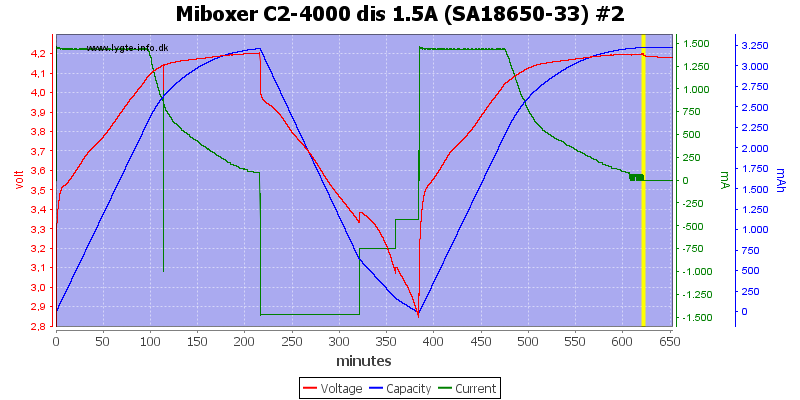
The second slot is the same.
Display shows: 10h 3265mAh 155mOhm (Display will only show hours when time is above 10 hours).
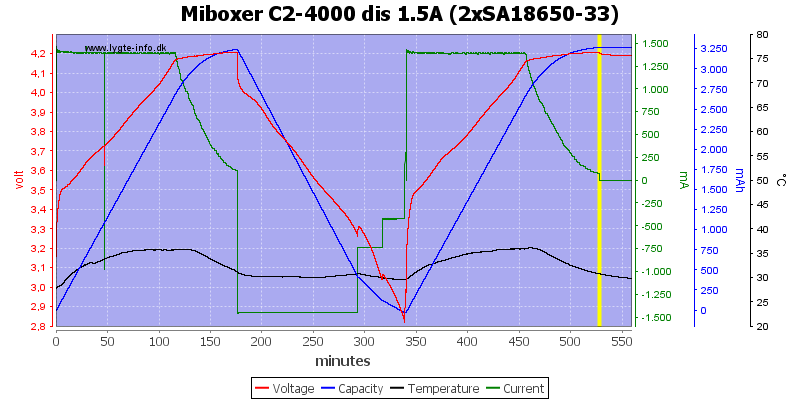
Two batteries at a time is no problem, even with 1.5A discharge current.
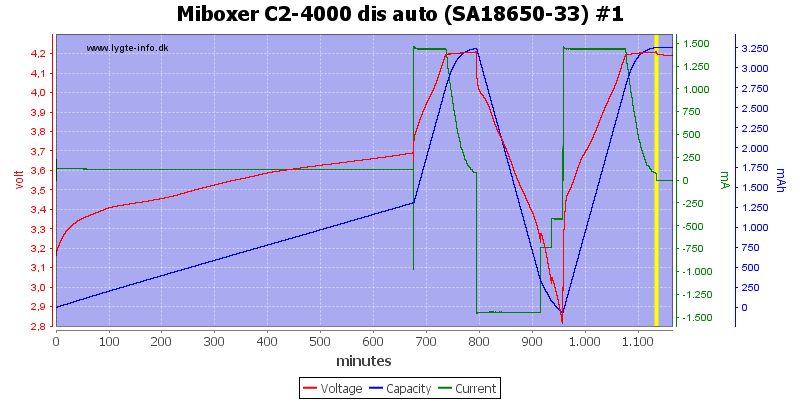
Here I use automatic current selection, at first it selects a very low current, when it checks the internal resistance it increases the current to maximum.
Display shows: 19:12 3407mAh 54mOhm
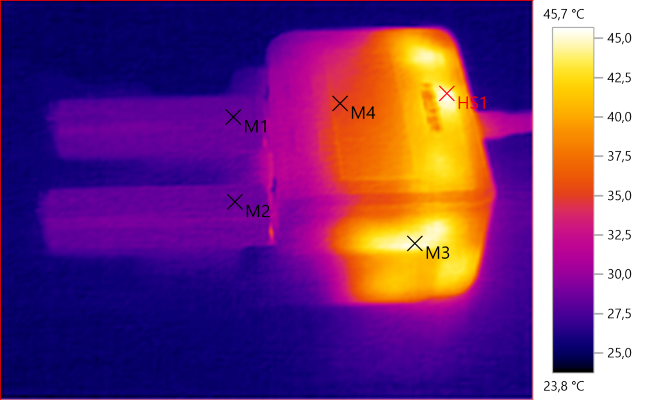
M1: 28,1°C, M2: 28,6°C, M3: 44,9°C, M4: 35,0°C, HS1: 45,7°C
Here the reason for the fan is obvious, I have not seen any other charger with batteries this cool when discharging. All the heat is kept away from the batteries, even at 1.5A.
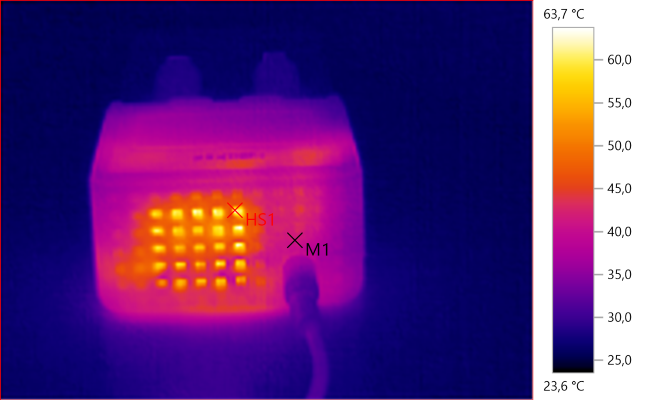
M1: 41,1°C, HS1: 63,7°C
Somewhere inside the charger it is a bit warm.
Charging 4.35V LiIon
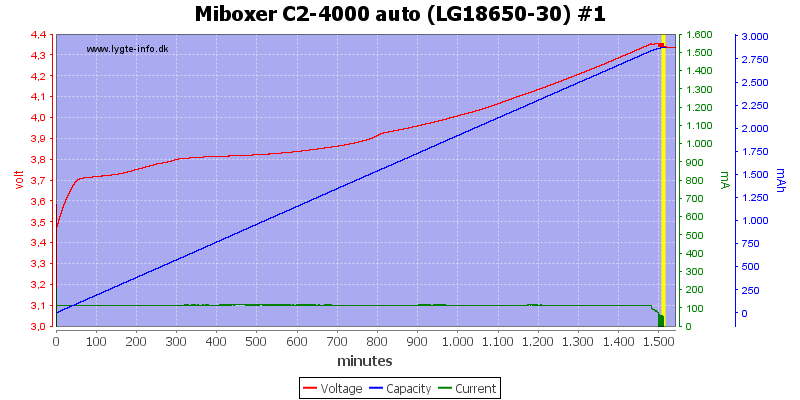
Nothing surprising here, I used auto and the cell was a bit old, i.e. the charge current is rather low.
Display shows: 25h 2558mAh 593mOhm
Charging 3.6V LiFePO4
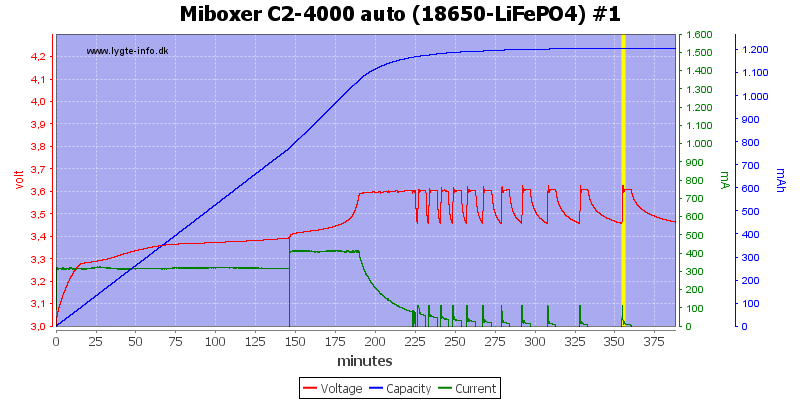
Display shows: 3:44 1113mAh 113mOhm
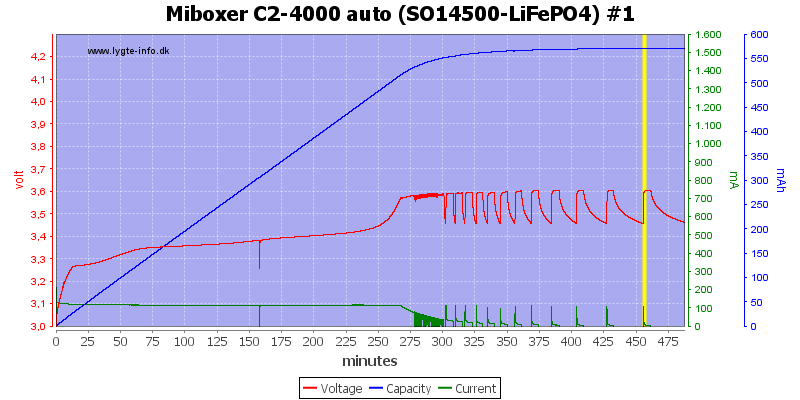
The charger has no problem charging LiFePO4 batteries, but it cannot really decide when to stop.
Display shows: 5:00 479mAh 409mOhm
Charging NiMH
Currents: auto, 0.1, 0.2, 0.3, 0.5, 0.8 and 1.0
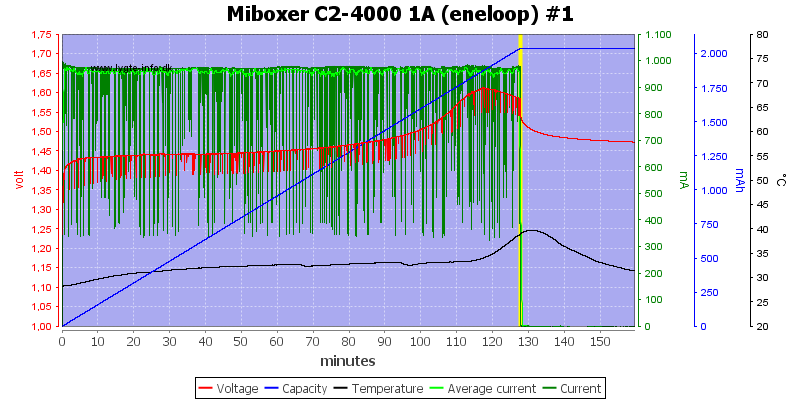
This NiMH charge looks like a good -dv/dt termination and as can be seen on the temperature track the cell is full.
Display shows: 2:07 1982mAh 222mOhm
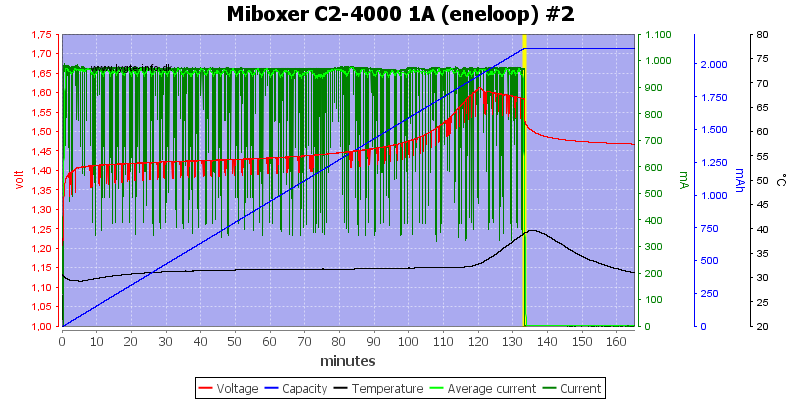
The other slot is the same.
Display shows: 2:13 2040mAh 81mOhm
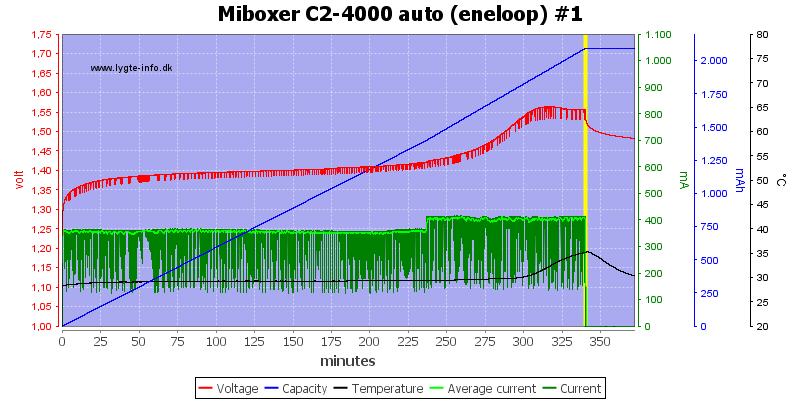
It also works fine with automatic current selection.
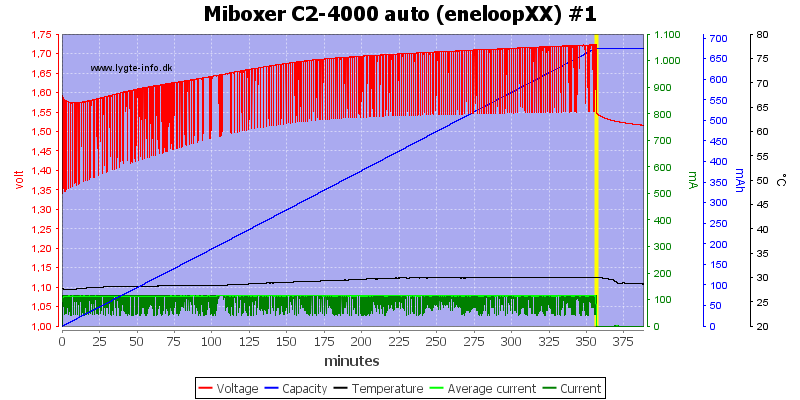
But not as well with this old cell.
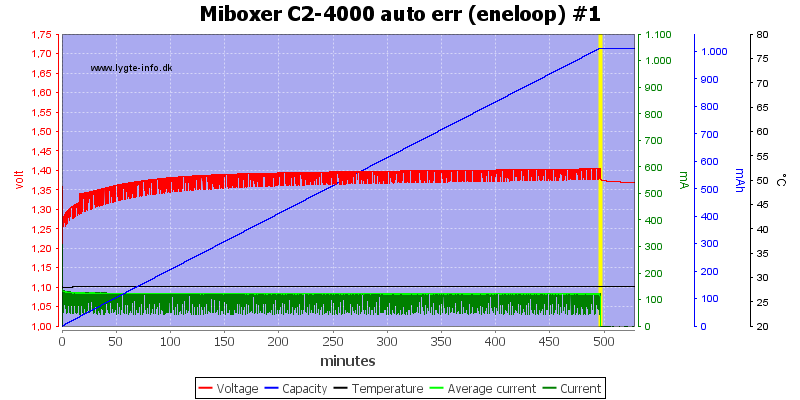
Here the charge selected a very low charge current and that means no -dv/dt signal, after 500 minutes the charger gives up and reports error.
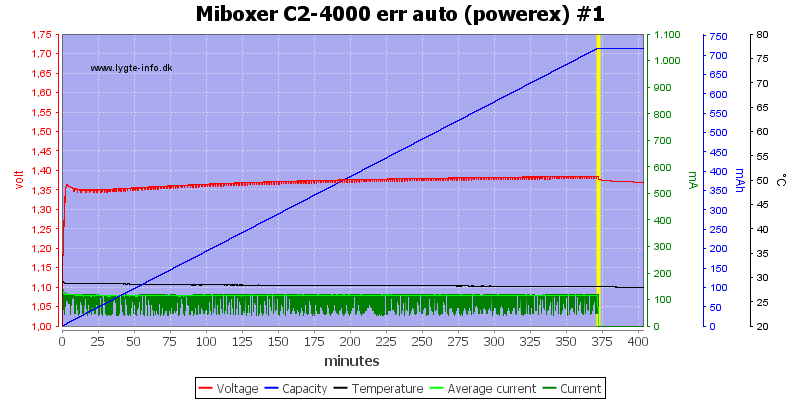
Same with this cell.
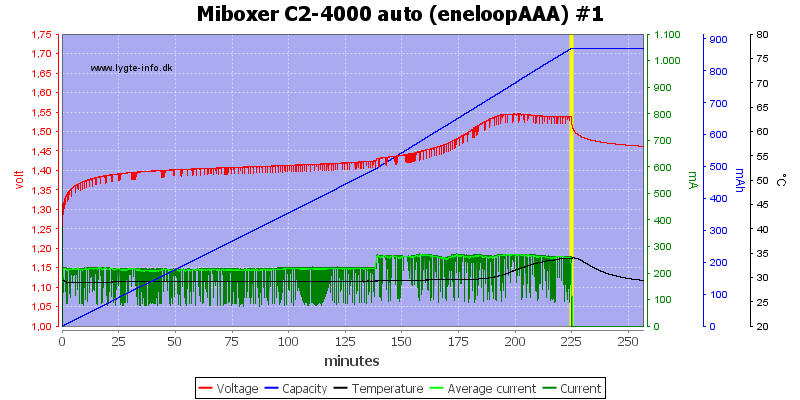
The AAA cell is handled fine.
Display shows: 3:44 716mAh 184mOhm
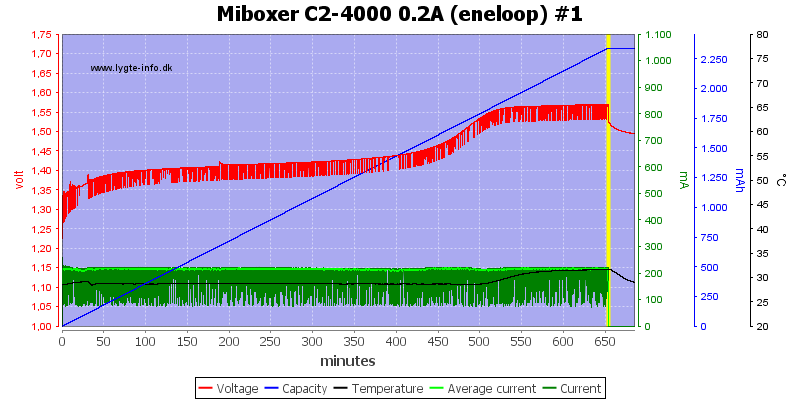
The charger can terminate at fairly low current, here I selected 0.2A and it did terminate albeit a bit slow.
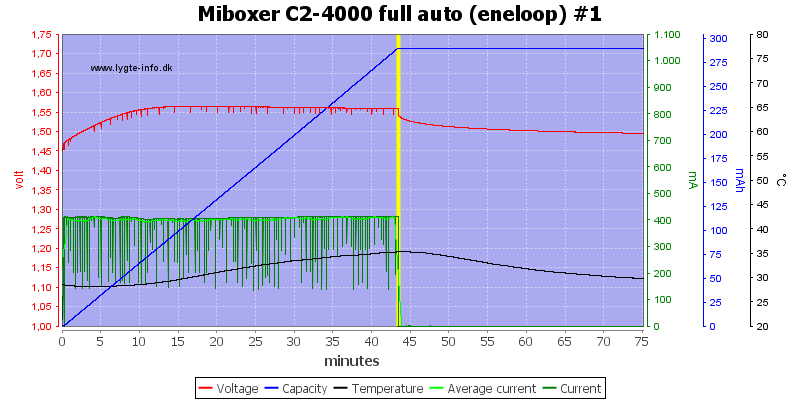
Using -dv/dt usual means it takes some time to detect a full cell and on this charger it definitely does.
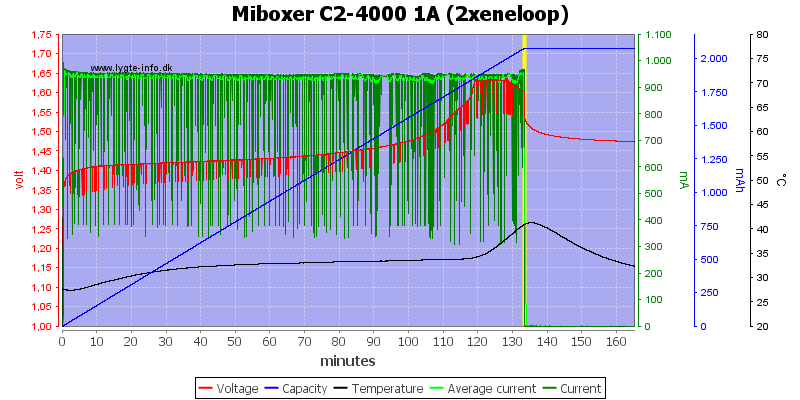
No problems charging two cells with 1A at the same time.
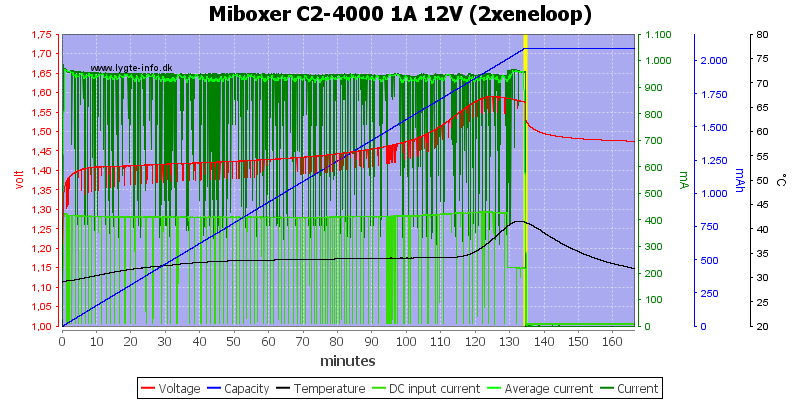
The charger needs about 0.4A from 12V for it.
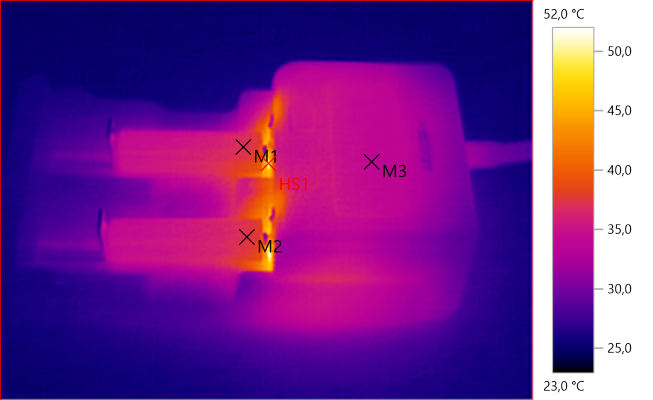
M1: 36,9°C, M2: 37,2°C, M3: 34,1°C, HS1: 52,0°C
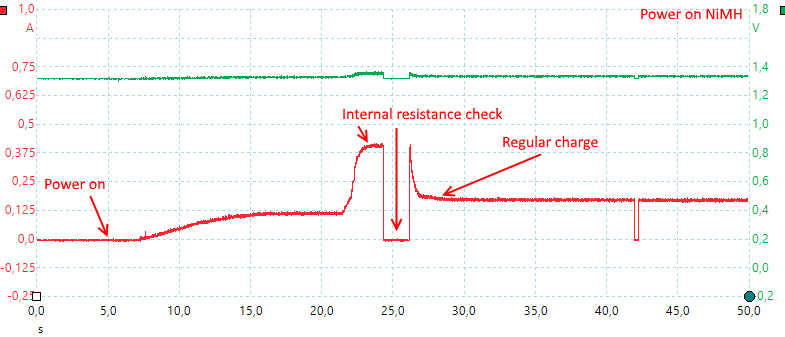
The startup with NiMH is different from LiIon, here it first charges slowly for some time, then increases current and then turns current off, after that it have measured the internal resistance and can select a charge current.
The display reflects this, at first it will only show voltage and current, after the IR check it will also show internal resistance.
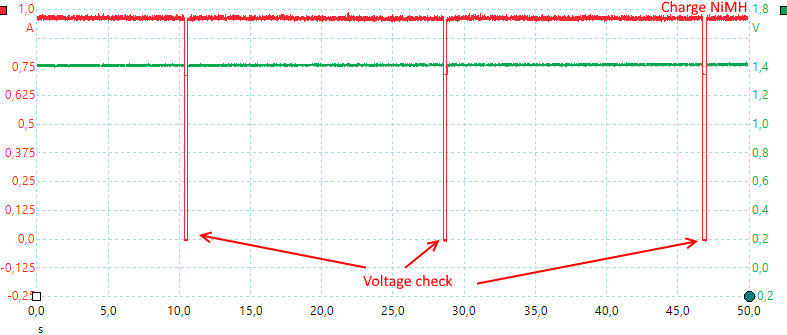
During charging it will pause once in a while to measure voltage and probably also internal resistance.
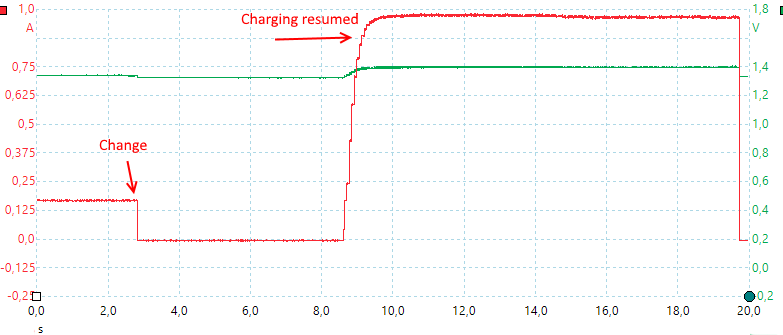
When staring on a current change the current is turned off, until the selection times out.
Testing NiMH
The charger can test batteries, this includes a charge, a discharge and a final charge at the selected current (including auto).
When discharging the fan is used (The fan runs at full speed).
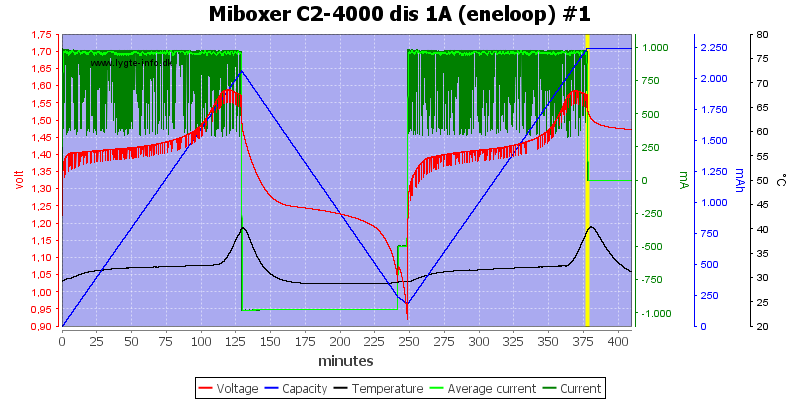
The charger will reduce the discharge current when the battery is nearly empty.
Display shows: 6:15 1917mAh 68mOhm
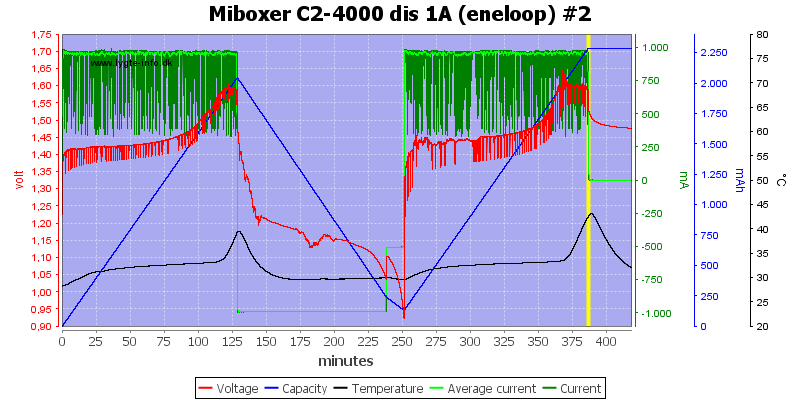
This slot works the same way.
Display shows: 6:25 1919mAh 81mOhm
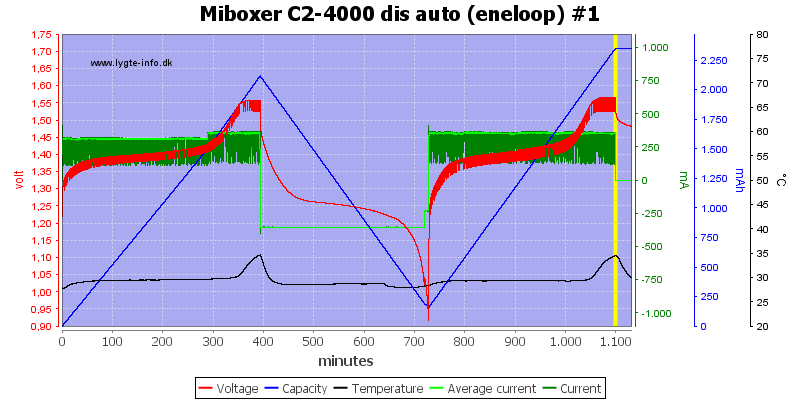
Here auto selected a lower charge current and the discharge current is also reduced.
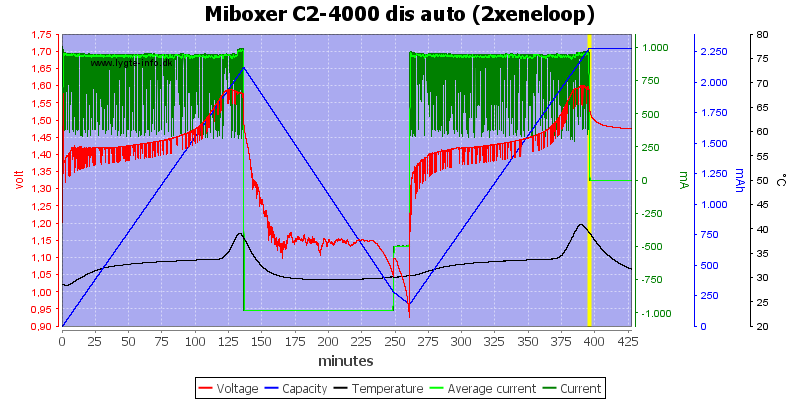
There is no problem discharging two batteries at a time.
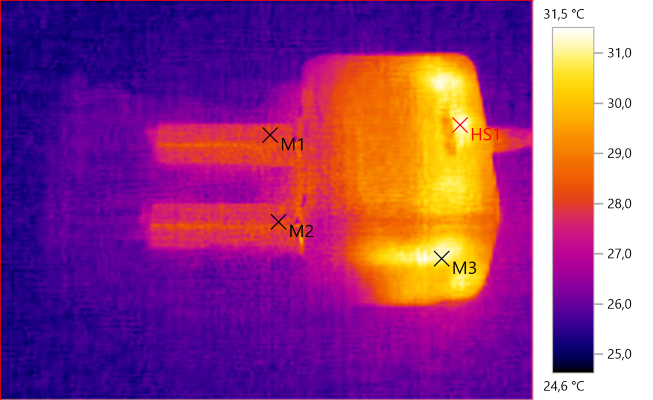
M1: 28,0°C, M2: 27,8°C, M3: 31,2°C, HS1: 31,5°C
Again the fan secures very cool batteries.
Internal resistance

The first table is for LiIon and it looks very good, but you have to be careful with getting good battery connections. I was not and got anything from 51mOhm to 191mOhm on the same battery. When I add the cable and resistors I was more careful, the connection resistance will only vary a few mOhm and as can be seen the charger produces very stable and precise results.

Here I had much better luck with the battery connection. Again the charge do a very good job, at least most of the time. It cannot detect the 10mOhm resistor, I wonder if there is a bug in the software (Could be rounding errors).
Testing the power supply with 2830 volt and 4242 volt between mains and low volt side, did not show any safety problems.
Conclusion
This charger is a an advanced analyzer with both charge and capacity test functions, mostly it works well, but there are a couple of details that could be improved:
LiIon is handled fine and the automatic current selection works well, the fairly high restart voltage can be discussed.
On LiFePO4 the termination is not very good, it restart all the time.
On NiMH it has problems with old cells
The user interface could be improved, the current selection is easy, but selecting different functions/chemistries is not very logical.
Some good details:
The discharge function do not heat the batteries, due to the fan.
Can do fairly high discharge current.
Internal resistance measurement is precise.
It supports from AAA to D or 10440 to 32650 sized batteries
Good LiIon & NiMH batteries are charged fine.
I will call it a good charger for LiIon and NiMH batteries.
Notes
The charger was supplied by a Miboxer for review.
Here is an explanation on how I did the above charge curves: How do I test a charger











































































